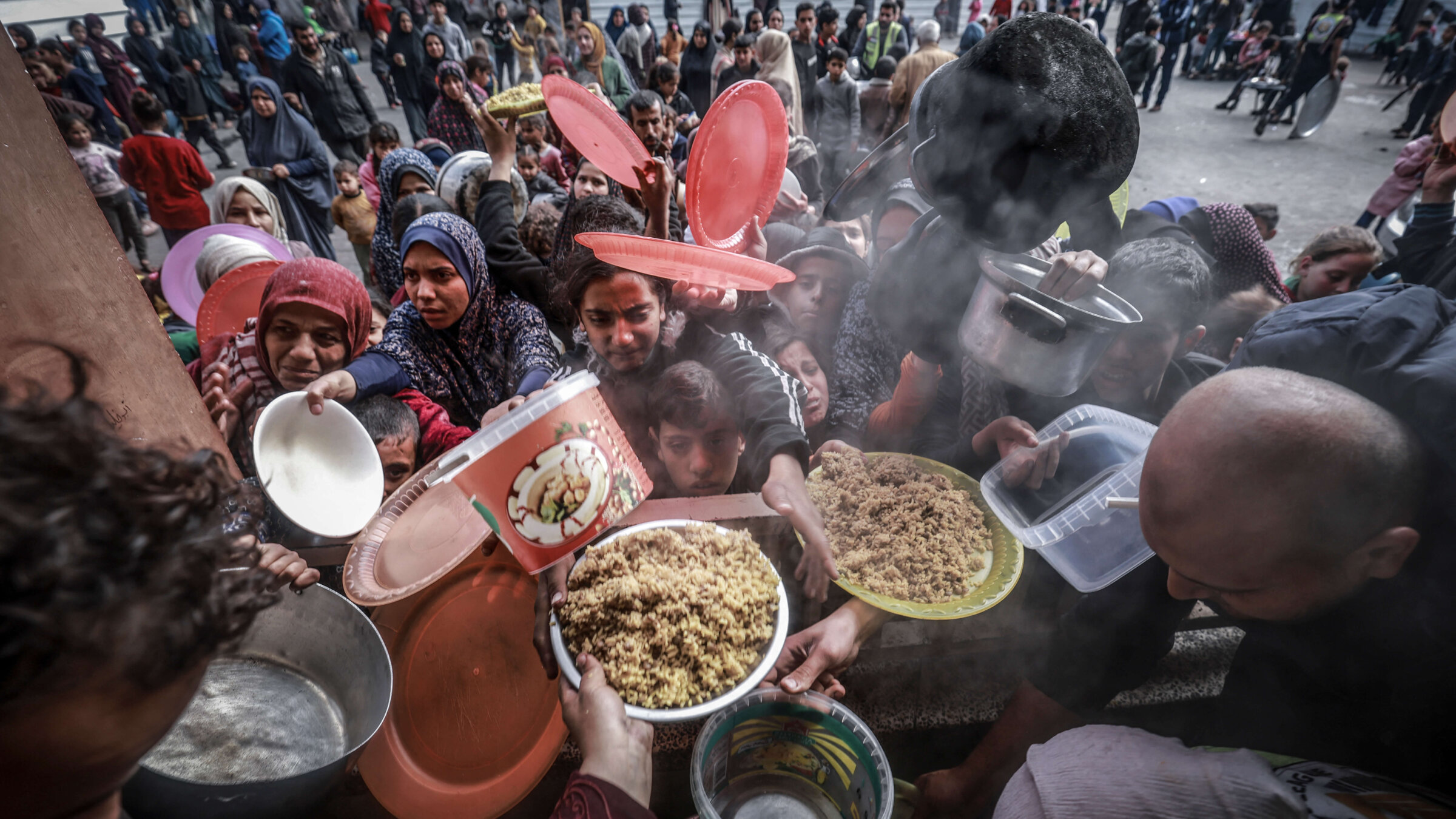After more than 100 Gazans died trying to access food, will the world finally address their starvation?
At least half a million Gazans are currently believed to be at direct risk of starvation

Displaced Palestinians gather to receive food at a government school in Rafah, Gaza, Feb. 19. Photo by Mohammed Abed/AFP via Getty Images
The average caloric intake of a granola bar is 180 calories — roughly the same number of calories that Jews imprisoned in the Warsaw Ghetto consumed on a daily basis.
Determined to starve them out, the Nazis deliberately limited food supplies to the 460,000 Jews trapped inside. An estimated 500,000 to 600,000 Jews across Poland ultimately died of starvation.
This morning, more than 100 Gazans converging on aid trucks in northern Gaza, desperate for food, were killed. The Israel Defense Forces said that the victims died during a stampede to reach the food on the trucks; Hamas said that IDF soldier fired into the crowd.
The deaths, which have drawn international horror and condemnation, are a profound example of how brutally Israel has reacted to the threat of mass starvation in Gaza.
For weeks, Israelis have protested in front of the Kerem Shalom and Nitzana border crossings to prevent trucks carrying humanitarian aid from reaching desperate Gazans. Despite repeated statements from Israeli officials that there are “no limits” on the amount of aid reaching Gaza, the Israeli government has been blamed for causing bureaucratic nightmares for humanitarian organizations with “arbitrary inspections,” by firing on U.N. vehicles returning from bringing in food and by allowing right-wing Israelis to camp out with their families and block aid trucks’ passage.
The United Nations’ Special Rapporteur on the Right to Food, Michael Fahkri, told The Guardian that Israel is “intentionally depriving” Gazans access to food, which “is clearly a war crime.” Last week, UNRWA, the U.N. agency that serves Palestinian refugees, reported that half a million Gazans are starving, and that all 2.3 million Gazans are experiencing acute food shortages.
Israel’s role in Gazans’ starvation is a profound violation of Jewish values, which hold that enforced deprivation like that we underwent in Warsaw is an astonishing injustice: Jews are commanded in the Torah not to ignore the suffering of their neighbor. It’s obvious that Gazans should not be killed en masse for seeking access to food — and it should be just as obvious that they should never have faced such food scarcity in the first place.
Throughout this war, when Israel has been criticized for taking inadequate steps to see to the welfare of civilian Gazans, a common response from pro-Israel advocates has been to blame Hamas. The argument goes something like this: Hamas, which perpetrated the Oct. 7 attack, is the governing body of Gaza and is responsible for civilian welfare in the strip; it routinely steals humanitarian aid from Gazan civilians; it’s their fault that civilians are suffering.
All of these statements are true. But they overlook the overwhelming moral and humanitarian responsibility Israel bears for the civilians suffering and dying under its military assault, even beyond its legal responsibilities. Today’s horrifying images of Gazan civilians dying as they surround an aid truck make that responsibility impossible to keep ignoring.
Their deaths make it painfully obvious that Israel is keeping Gazan civilians from accessing the resources they need to survive. This is true regardless of whether the Gazans killed while approaching the aid trucks were trampled or shot. As Eyal Lurie-Pardes, an Israeli human rights lawyer and Forward contributor, wrote on X: “According to intl law, there’s one entity that’s in charge of what’s happening in northern Gaza: Israel and its army.”
“It’s in charge of supplying food, maintaining order, etc.,” Lurie-Pardes added. “The tragic events this morning demonstrate the extent of Israel’s systemic failure in doing so.”
In February 1942, starving Jewish scientists in the Warsaw Ghetto conducted some of the most groundbreaking research in history on the effects of extreme hunger on the human body, closely documenting the impacts on children and adults’ physiology. Under horrifying conditions, the scientists hurried to consolidate their findings in a study, which they buried for safekeeping, called The Disease of Starvation: Clinical Research on Starvation in the Warsaw Ghetto in 1942. Their findings included unexpected insights, like that starvation softens the skeleton, as the body excavates minerals in the bones for nourishment.
I learned about the starvation of the Warsaw Ghetto on a reporting trip to Poland two years ago, when I visited one of the three remaining fragments of the ghetto wall in what is now an upscale apartment building’s parking lot. Staring at the battered red brick with rusted barbed wire on top, I couldn’t fathom how the non-Jewish population of Warsaw could ignore their gaunt neighbors, starving inside.
Yet today, we are perilously close to repeating that feat of willful blindness. Mainstream American Jewish institutions have been largely silent about the threat of mass starvation in Gaza. The U.S. government has so far taken only small steps toward pushing Israel toward ensuring Palestinian civilians have adequate access to food, although officials have broadly decried Israel’s efforts to provide aid and food as inadequate.
Photos proliferate on social media of “bread” that Gazans have baked with donkey and pigeon feed, due to a lack of flour. Palestinians are eating grass and drinking polluted water. Those most at risk of dying of starvation are children, particularly newborns. According to the U.N., more than 15% of northern Gazan children between 6 and 23 months old are “acutely malnourished.” The heads of the World Food Bank and the World Health Organization all agree that famine is “imminent.”
If we cannot unite against children starving to death, then we are long past the point of any pretense of moral leadership. Even before this morning’s devastating deaths, the evidence was overwhelming that Gazans are dying for lack of food. Their desperation is acute, and so should be our urgency to make sure they are fed.
















